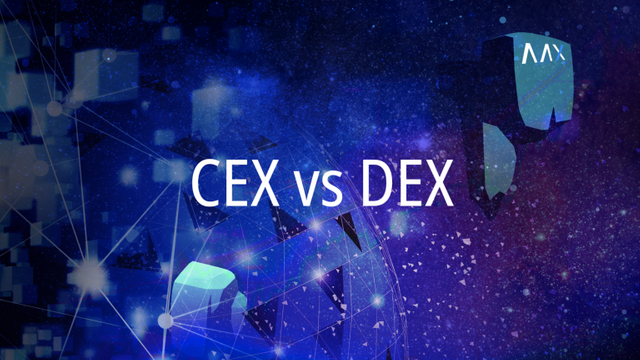.png)
Explain in your own words what an Exchange is. Differences between a Wallet and an Exchange. Mention the advantages and disadvantages of DEX and CEX. Have you used an Exchange before? tell us about your experience.

An exchange is the action of delivering a good and receiving compensation in exchange for it, this is what is generally applied in a management of any kind, but more focused on our subject, in the commercial field.
Now, for the topic under discussion, where the world of cryptos has the main focus, an exchange or Exchange, they are nothing more than digital platforms that make life easier for users in the exchange of their goods or assets, that is, their cryptocurrencies for others, or, for fiat money. This transaction can be done from anywhere in the world and to any place without having to travel, only with the use of devices such as mobile phones, a computer and the internet.
This management is carried out based on the rates offered by the market according to supply and demand, which are generally the lowest, and therefore, far exceed traditional methods.
In short, we can say that the exchange works like the stock market, but associated with the world of cryptocurrencies.
The operation of the exchanges is divided into two aspects: buying and selling. For either of the two transactions, certain requirements must be met:
1.- To sell, it is important to specify the amount of cryptocurrencies to be traded and what is the price of their sale. This request will be supported by a record in (Ask), which works as if it were an order book, that is, where the customer specified the price he agreed to make the sale.
2.- To buy, unlike the sale you have two options, so the user can choose the one that suits him best. The first is to search the order book to place an order, and the second is for the user himself to create his own order through a Bids, where the purchase conditions and the price to be paid are in accordance with his possibilities.
On the other hand, if the user wants to buy, there are two options: first, he can search for an order in the Order Book, or he has the possibility of creating a purchase order (Bids) in which he must specify the price that is willing to pay for the transaction. To complete the transaction, we choose a payment method, which will be based on the rules and policies established by the Exchange, which can be with the use of credit cards, debit cards, Paypal, among others.

There are two types of wallets, the Hot Wallets that work with the internet, they are special for people active in the purchase and sale of cryptocurrencies. Whereas Cold Wallets do not require internet and are more adapted to the most passive users, that is, who prefer the storage of cryptocurrencies for a long time. Assets are stored using a hard drive or a USB device.
For its part, an Exchange is the digital platforms that allow us to exchange our cryptocurrencies for other crypto or fiat money. However, there are companies with the duality of providing their services such as Wallet and Exchange, in short, we can carry out both functions, the safeguarding of our assets and the exchange management.
| Criteria | Grade | |
|---|---|---|
| Wallet | Exchange | |
| Function | Safeguard or warehouse of cryptocurrencies, that is, its role is like that of a digital wallet | They allow you to exchange the cryptocurrencies for others or fiduciary money, they are online exchange houses. |
| Connection methods | They can operate without internet when it comes to Cold Wallet and with internet if it is Hot Wallet | They require the internet to carry out exchange transactions. |
| Control over assets | Users have absolute control over their cryptocurrencies, only he can decide what to do with them and when to do it | The exchange house is the one who has control over cryptocurrencies |
| Setting the passwords | We are not the ones who generated the password | We ourselves generate our own password, it is personalized. |
| Password recovery or reset | When we lose the password there is no way to recover it, and therefore, we will lose our money. A printed backing is recommended in addition to the digital one | It gives us the option of recovering the password through a very simple method. For this reason, we do not run the risk of losing our assets. |

Before explaining the advantages and disadvantages of DEX and CEX, it is important to know that these refer to types of exchanges. The main ones are: centralized and decentralized, CEX (Centralized Cryptocurrency Exchange) and DEX (Decentralized Exchange).
The CEXs are exchanges that work like traditional stock brokerages, a central entity is in charge of managing the goods, they have all control over our assets. Simply put, a company is in charge of managing the exchange and is governed by drivers such as KYC (Know Your Customer) and AML (Anti-money laundering).
DEXs are decentralized exchanges, they are not governed by a company or central authority, that is, exchanges are made directly, without intermediaries. Which means that it is the users themselves who control their cryptocurrency transactions through the purchase and sale, with the use of point-to-point applications.
Advantages of CEX
- It is more popular for newbies, since it uses a simple interface, very similar to traditional banking platforms.
- Provides the ability to exchange cryptocurrencies for fiat money.
- Since they offer greater liquidity, users can operate transactions in the shortest possible time and in a simple way.
- They are available in almost every country in the world, but subject to the corresponding regulations.
- They have a higher volume of transactions because they allow users to buy and sell crypto using fiat money, in addition to the use of various payment options, such as transfers, debit or credit cards, or online payment methods. like Paypal.
- Users are exempt from commissions for bank deposits made.
- It offers a greater diversity of cryptocurrencies so that the user can choose the one that best suits their needs or according to their convenience.
Disadvantages of CEX
Because users cannot control and use private keys, they run the risk of losing their assets. Practically, users must fully entrust their funds to the exchange.
- There is no anonymity or privacy, since when registering, the user is required to provide relevant personal information such as email, full name, bank account records and place of residence, among others. All in order to satisfy the governmental entities by which they are governed.
- Just as decentralized exchanges are present in many countries, in some there are limitations regarding the use of bank transfers and credit cards.
- The options you offer to transfer currency are somewhat limited.
- When it comes to selling bitcoin, the commissions are quite high.
- They depend on a central server, if this fails, the whole system fails.
- Greater vulnerability to attack by hackers, due to the fact that all information is stored in a central server.

Advantages of DEX
- Anonymity reigns. They are called “purer”, since only information is required for the blockchain, that is, in order to operate, a wallet address is necessary.
- As the intervention of third parties is not necessary, we are responsible for our funds and for the entire process that involves sale and purchase, in short of the exchange.
- It presents less risk of being hacked, thanks to the fact that it works in a very similar way to Blockhain technology, that is, it operates under the premise of a computer network.
- Operations due to a node crash are not completely interrupted, as is the case with CEXs, which depend on a central server. This means that if one node fails, the rest can operate without problems.
- The collection of commissions is considerably low and in some cases it is practically nil.
- Thanks to the fact that they work under the P2P (peer-to-peer) premise, it is the users themselves who can determine the exchange rates at the time of making the transactions.
Disadvantages of DEX
- Its interface is not feasible for new users, it can be somewhat complex, since it requires connection with other dapps.
- The DEX do not offer many options of tools like the CEX, on the contrary, we can only place two types of orders: buy and sell.
- It is not possible to do a quick negotiation (instantaneously) in the face of the vertiginous fluctuation suffered by the prices of cryptocurrencies, since in order to become effective our requests, they must spread throughout the network, which generates losses of time that affect our transactions, just because of price changes, many times in seconds.
- In relation to decentralized exchanges, the operability they offer is much higher.
- It is only possible to carry out exchanges, it can only be executed from the same blockchain.

Currently, there are many Exchange platforms, since as cryptocurrencies have emerged, in the same way they are at the forefront. I consider myself inexperienced in this world and the only experience I have with Exchange is with the Orinoco catwalk , which I have been using for a short time, just a few months. My experience is that I have noticed that it is very secure, its interface is quite simple and the service is quite fast. However, it has rarely happened to me that it takes time to exchange cryptocurrencies to fiat money from my country, perhaps, it happened to me a couple of times, but I can attest that I have received a good service.

This is the end of my Task 7. Thank you for reading my Post.
cc: Professor @dilchamo



